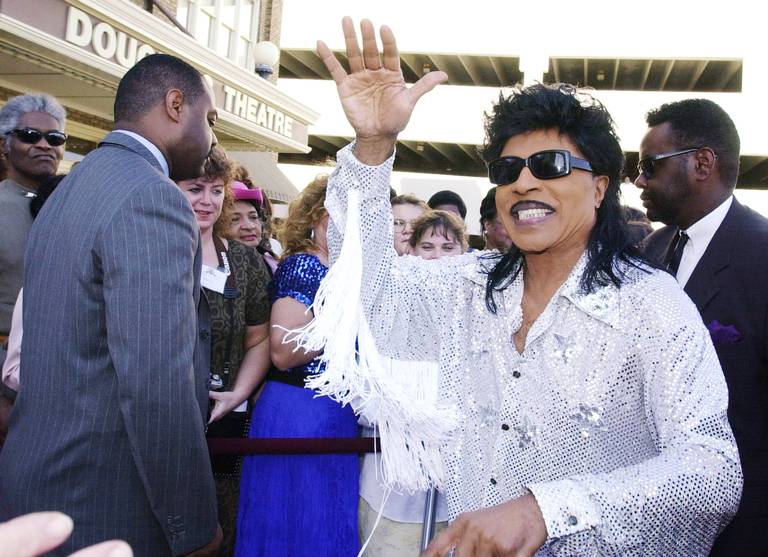
The Telegraph in Little Richard’s hometown of Macon, Ga., published its photographs of Richard visiting the city throughout the years. (Credit: Jason Vorhees/The Telegraph)
Was He the Founder of Rock ‘n’ Roll?
With Cash, Facebook ‘Likes’ the News:
Half of Windfall Helps Communities of Color
Report for America Deploys 42% of Color
Reporter on Ga. Story Hears Shots as He Files
Writer Jill Nelson Outraged After Arrest
Hispanics Lead in Job Losses Due to Virus
Jenn White Named Host of NPR’s ‘1A’
Copy Editors Rethink ‘Disabled,’ ‘the Homeless’
Critics of ‘1619 Project’ Jeer Its Pulitzer
Short Takes
[btnsx id=”5768″]
Was He the Founder of Rock ‘n’ Roll?
News organizations scrambled Saturday to report the death of Little Richard at age 87 that morning, but differed over whether he was a founder of rock ‘n’ roll or the founder.
A headline in Rolling Stone, one of the first to file at 9:30 a.m. ET, declared, “Little Richard, Founding Father of Rock Who Broke Musical Barriers, Dead at 87: Pianist-singer behind ‘Tutti Frutti,’ ‘Good Golly Miss Molly’ and ‘Long Tall Sally’ set the template that a generation of musicians would follow.”
The Daily News in New York, posting at 10:37 a.m. ET and citing Rolling Stone as its source for the news, said Richard “established rock ‘n’ roll as a genre.” Larry McShane wrote, “The widely-imitated singer and pianist established rock ’n’ roll as a genre with just one rule — there are no rules.”
The New York Times, which posted its obituary at 10:34 a.m. ET, apparently prepared in advance, was equally admiring but not as bold in assessing Richard Penniman’s place in rock ‘n’ roll history.
“Little Richard did not invent rock ’n’ roll,” Tim Weiner wrote, “Other musicians had already been mining a similar vein by the time he recorded his first hit, ‘Tutti Frutti’ — a raucous song about sex, its lyrics cleaned up but its meaning hard to miss — in a New Orleans recording studio in September 1955. Chuck Berry and Fats Domino had reached the pop Top 10, Bo Diddley had topped the rhythm-and-blues charts, and Elvis Presley had been making records for a year.
“But Little Richard, delving deeply into the wellsprings of gospel music and the blues, pounding the piano furiously and screaming as if for his very life, raised the energy level several notches and created something not quite like any music that had been heard before — something new, thrilling and more than a little dangerous. As the rock historian Richie Unterberger put it, ‘He was crucial in upping the voltage from high-powered R&B into the similar, yet different, guise of rock ’n’ roll.’ . . .”
The Times headline read, “Little Richard, Flamboyant Wild Man of Rock ’n’ Roll, Dies at 87: Delving deeply into the wellsprings of gospel music and the blues, and screaming as if for his very life, he created something new, thrilling and dangerous.”
The Los Angeles Times likewise was admiring but circumspect. Its story by Richard Cromelin, posted at 7:51 a.m. PT, led with, “Little Richard, the flamboyant, piano-pounding showman who injected sheer abandon into rock ’n’ roll in its early days, only to abandon the music again and again because it conflicted with his religious yearnings, died Saturday.”
The event was an occasion for bright writing and searching for the local angle.
Rolling Stone’s story by David Browne, no doubt also prepared in advance, began, “Little Richard, a founding father of rock and roll whose fervent shrieks, flamboyant garb, and joyful, gender-bending persona embodied the spirit and sound of that new art form, died Saturday. He was 87. The musician’s son, Danny Jones Penniman, confirmed the pioneer’s death to Rolling Stone. The cause of death was bone cancer, the musician’s lawyer Bill Sobel told
Rolling Stone.”
The L.A. Times wrote, “In hits such as ‘Tutti-Frutti,’ ‘Long Tall Sally’ and ‘Good Golly, Miss Molly,’ the singer pushed the limits of tempo and vocal intensity, creating frantic explosions of sonic confetti. His records entered a pure, primal realm that transcended verbal expression, embodied in his falsetto whoops and signature incantation: a-wop-bop-a-loo-bop-a-lop-bam-boom. . . .”
The Macon (Ga.) Telegraph, the hometown newspaper, quoted Rolling Stone’s confirmation of Richard’s death and displayed photographs of the singer visiting Macon throughout the years.
The Telegraph story, filed at 09:58 a.m. ET, was written by Joe Kovack Jr.
It quoted Richard saying in 2012 that though he had spent much of his life on the West Coast “you still can’t beat your home. You still love your home better than anywhere you’ve ever been.”
The Tennessean in Nashville, where Richard spent his last years, included this quote from Michael Gray, museum editor at the Country Music Hall of Fame: “It’s almost as if he made Nashville his second home (in the ‘50s). The R&B scene here was so hot, he told me that he could make more money here than all of the other cities he was playing.”
The story by Dave Paulson was published at 9:53 a.m. CT.
In Out magazine, which overs LGBTQ issues, Mikelle Street wrote, “From Macon, Georgia, he was one of a dozen children but moved out of his childhood home as a teen because of early signs of his sexuality. He would later have a long, public battle with his sexuality and his Christian upbringing where he would come out, before then denouncing homosexuality as unnatural.“
Although Richard was African American, black assessments seemed scarce in the first wave of stories in the mainstream media.
Entertainment columnist Chuck Arnold wrote in the New York Post under the headline, “What Little Richard taught these music legends: From soul to sex.”
The home page of BlackPressUSA.com, the news service of the black press, had a well-displayed story on the death of music executive Andrew Harrell, but nothing on Richard until a tribute from Lauren Victoria Burke was posted at 3 p.m. Eastern.
Likewise, Richard was missing during the morning from the Grio and Blavity, two other black-oriented websites.
However, EURWeb.com had a story by Fisher Jack that quoted Rolling Stone as its source on the death, and BET.com had four paragraphs at 12:50 p.m. NBC BLK also weighed in.
The Root, which also had its own story, began with a quote from Richard himself on his significance
With Cash, Facebook ‘Likes’ the News
Half of Windfall Helps Communities of Color
Report for America Deploys 42% of Color
Reporter on Ga. Story Hears Shots as He Files
Writer Jill Nelson Outraged After Arrest
Hispanics Lead in Job Losses Due to Virus
Jenn White Named Host of NPR’s ‘1A’
Copy Editors Rethink ‘Disabled,’ ‘the Homeless’
Critics of ‘1619 Project’ Jeer Its Pulitzer
Short Takes
[btnsx id=”5768″]

Half of Windfall Helps Communities of Color
Facebook announced Thursday that more than 200 news organizations would receive nearly $16 million in grants through the Facebook Journalism Project’s relief fund for local news. “Half are published by or for communities of color,” the organization said.
“These grants stem from $25 million in local news relief funding announced in March as part of Facebook’s $100 million global investment in news.”
The receiving news outlets range from large-city operations such as the Atlanta Journal-Constitution ($150,000) and Detroit Public Television $100,000) to alternative newspapers such as MinnPost in Minneapolis ($100,000) and the Chicago Reporter ($100,000).
They include media targeting African Americans, such as the Los Angeles Wave and Independent Newspaper Group ($100,000) and WURD Radio in Philadelphia (40,000); and Latinos, such as Latino News in Trussville, Ala. ($82,650) and the sponsor of El Centro Hispano in Knightdale, N.C. ($66,000)
Grants will also go to Little Saigon TV Network in Westminster, Calif. ($99,993) and Erie Chinese Journal in Cleveland ($64,998), among those serving Asian Americans.
Indian Country Media in Grand Rapids, Mich. ($96,887); Pride Source Media Group in Livonia, Mich., targeting the LGBTQ community ($100,000); and newspapers in Guam, Puerto Rico and Canada are also on the list. So is the MLK50: Justice Through Journalism project in Memphis, Tenn. ($75,000), and several members of the black press.
The state-by-state list is here.
 The Facebook announcement also included, “$10.3 million being awarded to 144 US local newsrooms as part of the COVID-19 Local News Relief Fund Grant Program. The fund is supporting many publishers who are hardest hit by this crisis: nearly 80 percent of recipients are family- or independently owned and more than half are published by or for communities of color.”
The Facebook announcement also included, “$10.3 million being awarded to 144 US local newsrooms as part of the COVID-19 Local News Relief Fund Grant Program. The fund is supporting many publishers who are hardest hit by this crisis: nearly 80 percent of recipients are family- or independently owned and more than half are published by or for communities of color.”
Funds “will be used throughout 2020 to support projects focused on longer-term sustainability in local journalism. This includes $2.5 million for Report for America, helping the group place 225 journalists in 160 local news organizations for their 2020 reporting corps.
“Partnering with leading industry organizations like The Local Media Association and The Lenfest Institute for Journalism to move quickly, the Facebook Journalism Project has awarded more than 600 grants across the US and Canada since the pandemic began. Additional grant programs have been launched to support journalism around the world.
“After receiving more than 2,000 applications for the COVID-19 Local News Relief Grant Program from newsrooms across every state in the US, all US territories and Washington, D.C., we are providing grants ranging from $25,000-$100,000 to help publishers continue serving communities during the coronavirus outbreak. . . .”
- Fares Akkad, Facebook: Facebook Invests $750,000 to Support Middle East and North Africa Newsrooms During COVID-19
- Kristi Eaton, Poynter Institute: Many street newspapers, which benefit people experiencing homelessness, have halted sales (April 27)
- Keren Goldshlager and Orlando Watson, Facebook: Launching a $1M Grant Program to Support Fact-Checkers Amid COVID-19
- Claudia Gurfinkel, Facebook: Facebook Invests $2 Million to Support Latin America News During COVID-19
- John R. Vile, Free Speech Center, Middle Tennessee State University: Book Review: African Americans and the First Amendment: The Case for Liberty and Equality

Report for America Deploys 42% of Color
“When Report for America announced the selection of 225 journalists for its 2020-21 reporting corps recently, it shared welcomed news for those calling on newsrooms to better reflect the diversity of the communities they serve: 42 percent of this year’s corps are persons of color,” Sam Kille reported Thursday for Report for America.
“This stands in contrast to the reality that people of color represent only 21.9 percent of the salaried workforce among our nation’s print and digital newsrooms according to the 2019 ASNE Newsroom Employment Diversity Survey; and 25.9 percent of television and 14.5 percent of radio newsrooms according to the latest RTDNA/Lawrence Herbert School of Communication at Hofstra University Annual Survey.
“Ninety-five corps members identify as persons of color. In addition to diversity of race, this year’s corps also reflects a growing number of women and for the first time, veterans. Within this year’s corps (as self reported):
- “17% are Hispanic or Latino
- “12% are Black or African American
- “10% are Asian American or Pacific Islander
- “2% are Native American
- “1% are Middle Eastern
- “69% are women
- “5 are post-9/11 U.S. military veterans
- “The average age is 27”
” ‘We are extremely proud of our record of diversity, but there is more work that we can all do to create opportunities for emerging journalists that better serve our communities’ need for local news that they can trust,’ said Steven Waldman, co-founder and president of Report for America, an initiative of the GroundTruth Project.
“This work includes partnering with minority-owned or focused newsrooms, according to Alison Bethel McKenzie, director of corps excellence at Report for America. Previously, she was executive director of the Society of Professional Journalists, where she was only the second woman and the first person of color to serve in that capacity in SPJ’s 111 years. . . .”
- Native American Journalists Association: Report for America announces 2020-21 Indigenous affairs corps members
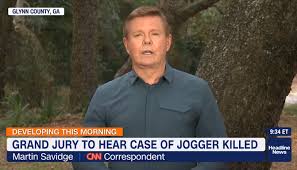
Reporter on Ga. Story Hears Shots as He Files
“When CNN correspondent Martin Savidge was filming a report in the Georgia neighborhood where a 25-year-old man was fatally shot” — for which a father and son were taken into custody Thursday — “loud gunfire started to go off,” Rudy Takala reported Wednesday for Mediaite.
“The correspondent claimed the shots were a message aimed ‘directly’ at the news crew.
“Savidge said his crew heard the shots as they were filming on the same Brunswick street where Ahmaud Arbery was . . . shot and killed by two men in February.
” ‘That is semi-automatic gunfire,’ Savidge said after airing the footage on CNN. ‘Nobody was hit. Nobody was hurt. But there was a lot of it. Quite frankly, I can’t tell you if that was somebody firing blanks or whether it was just somebody [who] had a very good sound system. But clearly, that was a message directed directly at us, telling us that we weren’t wanted in that community. Remember, we’re walking down that same street that the young victim had been running down, and we’re going in the same direction. And it was gunfire once again.’ ”
As Michael Brice-Saddler, Colby Itkowitz and Cleve R. Wootson Jr. reported for the Washington Post, former police investigator Gregory McMichael, 64, and his son, Travis McMichael, 34, “were charged with murder and aggravated assault Thursday evening, more than two months after 25-year-old Ahmaud Arbery was killed. . . .”
- Charles M. Blow, New York Times: The Killing of Ahmaud Arbery
- Wes Moore, Washington Post: We almost didn’t hear about Ahmaud Arbery. These stories must not go untold
- Rick Rojas, Richard Fausset and Serge F. Kovaleski, New York Times: Georgia Killing Puts Spotlight on a Police Force’s Troubled History
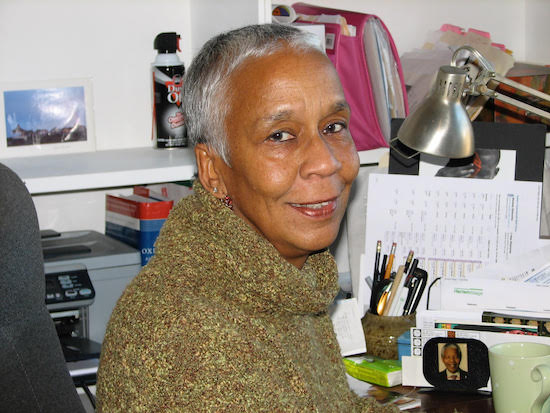
Writer Jill Nelson Outraged After Arrest
New York writer Jill Nelson, perhaps best known for “Volunteer Slavery: My Authentic Negro Experience,” her 1993 account of her time at the Washington Post Magazine, is alerting city and state officials to “police overreach and the stifling of dissent” after her arrest last month for writing graffiti.
“On Thursday, April 16, 2020, I was arrested in Manhattan and detained by members of the New York City Police Department on Broadway and 163rd St in Washington Heights,” begins a letter to New York Attorney General Letitia James.
“I was blocked in by two police cars and four officers, frisked, searched, cuffed, shoved into a police vehicle, taken to the NYPD 33rd Precinct and put in a filthy cell for five hours. The charge? Writing graffiti. Specifically TRUMP = PLAGUE.
“At no time was I read my rights, offered a phone call, lawyer, or a glass of water. I had to insist on using the bathroom. I was given a mask only after demanding one. Abruptly, around three o’clock, I was told I will be ‘going downtown’ to 100 Centre Street because I didn’t have a photo I.D. with me. This after I offered to accompany officers to my home to get my New York State driver’s license.
“Finally allowed a phone call, I call home, tell my husband I’ve been arrested, ask him to bring my license to the station. The call is cut off by one of the arresting officers after 60 seconds, before I can tell my husband in which precinct I am being held. Thankfully, he figured it out.
“As I left the station at 6:37 PM with a Desk Appearance Ticket, an Officer threatened that if I failed to show up at 100 Centre Street on August 14, 2020, ‘We’ll come to your house and arrest you.’
“The NYPD’s extreme, disrespectful, and plainly threatening behavior, appalling at any time, is even more so in the midst of the Covid-19 pandemic. [This] was the day before mandatory wearing of masks and increased fines for failure to socially distance went into effect in New York City. The 33rd Precinct is in Washington Heights, one of New York City’s hardest hit communities. Surely the police, sworn to ‘protect and serve,’ have something crucial to do in these terrible times other than arrest and detain a senior citizen peacefully voicing her opinion.
“As my elected representative, I hope you are outraged by these events, yet another example of police overreach and the stifling of the dissent that is crucial to a democracy. Especially in a time of crisis. I hope you will take action to make sure no other citizens are treated in this way. . . .”
A police spokesman confirmed the incident took place but said the police report could not be shared with the media.
- Hakim Bishara, hyperallergic.com: Journalist Arrested in Manhattan for Writing “Trump=Plague” in Chalk
- Adam Harding, WNBC, New York: ‘Graffiti Grandma’ Says She Was Arrested For Writing Message in Chalk on NYC Building
- Carol Tannenhauser, West Side Rag: 67-Year-Old Writer Handcuffed and Jailed Over Chalk Graffiti; ‘Petty’ Arrest Amidst a Plague
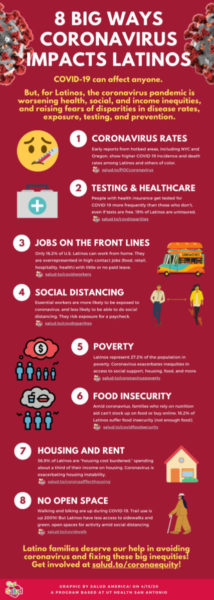
Hispanics Lead in Job Losses Due to Virus
“Hispanics are nearly twice as likely as whites to have lost their jobs amid the coronavirus shutdowns, according to a Washington Post-Ipsos poll, underlining that the pandemic is wreaking a disproportionate toll on some racial and ethnic groups,” Tracy Jan and Scott Clement reported Wednesday for The Washington Post.
“The poll finds that 20 percent of Hispanic adults and 16 percent of blacks report being laid off or furloughed since the outbreak began in the United States, compared with 11 percent of whites and 12 percent of workers of other races.
“Blacks and Hispanics are also dying of covid-19 at higher rates than whites, according to the Centers for Disease Control and Prevention. . . .”
Meanwhile, blacks and Hispanics are more likely than whites to say the media have “gotten the risks about right of the coronavirus outbreak,” according to the Pew Research Center.
Asked the question April 20 to 26, the percentage of total adults who agree was 39 percent, with 36 percent of non-Hispanic whites, 50 percent of non-Hispanic blacks and 42 percent of Hispanics in agreement.
- Alfredo Corchado, New York Times: A Former Famrworker on American Hypocrisy
- Nick Charles, NBC News: For many cautious African Americans, the move to reopen America is not a ‘black friendly’ campaign
- Mary C. Curtis, Roll Call: Has a pandemic changed America or revealed its heart?
- Derrick Z. Jackson, Union of Concerned Scientists: The Push to Relax COVID-19 Protections Exposes Age-Old Racial Wounds
- Elvia Malagón, Hal Dardick, Cecilia Reyes and Jessica Villagomez, Chicago Tribune: Latino communities in Illinois see uptick in COVID-19 confirmed cases: ‘Physical distancing is a privilege’
- Rose Minutaglio, Elle: Navajo Nation Is Being Hit Hard By COVID-19. It’s My Job to Document It.
- National Association of Black Journalists: NABJ Announces COVID-19 Relief Fund
- Michele L. Norris, Washington Post: We cannot allow the normalization of firearms at protests to continue
- PEN America with Vincent Schilling of Indian Country Today: Local Heroes: Journalists Covering COVID-19
- Kevin Powell, “Good Morning America”: A letter to my 9-year-old friend during the coronavirus pandemic
- Jay Reeves, Associated Press: In clamor to reopen, many black people feel overlooked
- William C. Rhoden, The Undefeated: How a cross-country drive revealed uncertainty for black Americans during COVID-19 (April 29)
- Afi Scruggs, Eye on Ohio: CDC Reverses Course Again on Using Race As Testing Criteria
- Adam Serwer, The Atlantic: The Coronavirus Was an Emergency Until Trump Found Out Who Was Dying
- Ray Suarez, Washington Post: Sinking feeling: I clung to the middle class as I aged. The pandemic pulled me under.
Jenn White Named Host of NPR’s ‘1A’
 Jenn White (pictured), a midday host at public radio’s WBEZ-FM in Chicago, will succeed Joshua Johnson as host of the nationally syndicated NPR show “1A,” WAMU-FM in Washington, where “1A” originates, announced Thursday.
Jenn White (pictured), a midday host at public radio’s WBEZ-FM in Chicago, will succeed Joshua Johnson as host of the nationally syndicated NPR show “1A,” WAMU-FM in Washington, where “1A” originates, announced Thursday.
White, 45, hosts “Reset with Jenn White” and hosted the podcasts “Making Oprah” and “Making Obama.” Her first day on “1A” is July 6.
“With a name that nods to the First Amendment, 1A is a daily, live show that encourages listeners to ‘speak freely’ and stay connected. . . . Since launching in 2017, 1A has become a trusted source for public dialogue by more than 4 million listeners across over 375 NPR member stations nationally,” WAMU said.
In an on-air interview with WAMU’s Celeste Headlee Thursday, White said, “I’m specifically interested in the way news is delivered on public radio. Our work is important and fills a need. We are able to surround a story and add depth that informs our listeners. Our stories are filled with voices of real people from around the country, often from those marginalized. This enables public radio to dig under the rocks to uncover how policy impacts real people.
White also said, “. . . when I’m not working, I’m either listening to jazz, podcasts or devouring science fiction and fantasy novels. I love how science fiction challenges us to imagine a future and a world that includes people who don’t look or live like us.”
Elahe Izadi added Thursday in the Washington Post, “WAMU General Manager JJ Yore said that during the station’s search process, which yielded a list of 50 potential hosts, he was struck by White’s authority and ability to connect with interviewees. ‘She brought a kind of probing curiosity mixed with warmth and empathy.’
“The station also emphasized diversity during the hiring process. . . .”
Johnson, now at MSNBC, tweeted his congratulations and said he would be on MSNBC this Saturday at 3 p.m., 8 p.m. and 9 p.m., and Sunday at 3 p.m. and 9 p.m., all Eastern time.
Copy Editors Rethink ‘Disabled,’ ‘the Homeless’
“As the stylebook frequently mentions, using specifics for the individual is less likely to fall into stereotypes or offend. (We also believe that labels can be hurtful and misunderstood),” Merrill Perlman wrote Wednesday for Columbia Journalism Review.
She was describing changes in the print edition of the Associated Press Stylebook, the style bible in many newsrooms, unveiled at the national conference of ACES: The Society for Editing. Paula Froke, the lead stylebook editor, was present.
Perlman continued, “One twist to that: the entry previously labeled ‘disabled, handicapped’ has been changed to be simply ‘disabilities.’ That entry, which advises being specific about the type of disability, has now added this section:
“When possible, ask people how they prefer to be described (when the description is relevant).
“Some people, for example, refer to themselves as a disabled person or simply disabled, using identity-first language.
“Others prefer person with a disability, using person-first language. In describing groups of people, use person-first language.
“One change that led to a spirited discussion in the ACES session was adding an entry on ‘homeless.’ ‘Homeless is generally acceptable as an adjective to describe people without a fixed residence,’ the new style guide says.
” ‘Avoid the dehumanizing collective noun the homeless, instead using constructions like homeless people, people without housing or people without homes.‘ Those changes came, Froke said, because of requests by a city official and stylebook users. ‘When we tried to provide a specific definition for what homelessness entailed,’ she said, ‘we found that government agencies don’t always agree.’
“In the chat discussion accompanying the session, ACES members debated whether there was a better way to describe ‘the homeless.’ Among the suggestions were ‘unhomed,’ ‘people experiencing homelessness,’ ‘street involved,’ and ‘houseless.’ Froke noted that most of those terms were jargony.
“Writers and editors should be aware of having good intentions but bad outcomes, she said, ‘coming up with a different problem that people don’t understand.’ She added, ‘I think in many cases it’s possible to write around it.’ . . .”

Critics of ‘1619 Project’ Jeer Its Pulitzer
Critics of the New York Times Magazine’s “The 1619 Project,” which places the arrival of black people in 1619 front and center in the nation’s history, returned to their pens and computers after Nikole Hannah-Jones, the creator of the project, won the Pulitzer Prize Monday for commentary.
The headlines give the points of view: “The ‘1619 Project’ is filled with slovenliness and ideological ax-grinding,” read the title of a syndicated column from George F. Will.
Allen C. Guelzo in the Wall Street Journal: ‘The 1619 Project’ Tells a False Story About Capitalism, Too (paywall)
Dan McLaughlin in the National Review: The 1619 Project Wins a Pulitzer Prize for Agitprop
Disputing the centrality of slavery to the nation’s founding, Will says, “The Constitution was written in 1787 for a nation conscious of its youth. It would grow under a federal government whose constituting document did not acknowledge ‘property in man,’ and instead acknowledged slaves as persons.
“This gave slavery no national validation. It left slavery solely a creature of state laws and therefore susceptible to the process that, in fact, occurred — the process of being regionally confined and put on a path to ultimate extinction. Secession was the South’s desperate response when it recognized this impending outcome that the Constitution had facilitated. . . . “
Jake Silverstein, editor in chief of the New York Times Magazine, responded to the criticisms in some detail on Dec 29, updated Jan. 4.
In the National Review, McLaughlin quotes Slate’s reporting on the response from Dean Baquet, the Times’ first African American top editor, to a question at a Times staff meeting:
“to what extent you think that the fact of racism and white supremacy being sort of the foundation of this country should play into our reporting. Just because it feels to me like it should be a starting point, you know? . . . I just feel like racism is in everything. It should be considered in our science reporting, in our culture reporting, in our national reporting.’
“Baquet pointed, in his response, to the 1619 Project: ‘I do think that race and understanding of race should be a part of how we cover the American story . . . one reason we all signed off on the 1619 Project and made it so ambitious and expansive was to teach our readers to think a little bit more like that.’ ”
Gerald Horne, a historian who wrote “The Counter Revolution of 1776,” a subject of this column in 2014, pushed back against Will on Pacifica Radio’s “On the Ground” (audio) on Friday.
Hannah-Jones “slaughtered more than one sacred cow by calling into question the immaculate conception theory of the founding of the United States of America in 1776. Instead, she echoes the emerging thesis that this country was founded as a revolt against British abolitionism which was rising in the 1770s,” he said.
“The more things change, the more they remain the same because, recall that the late Lerone Bennett, Ebony magazine editor and author of a book that revised the vision of the heroic Abraham Lincoln was blackwashed and disparaged because of that book.
“What this points up is the fact that No. 1, there are sacred cows in this so-called marketplace of ideas, and No. 2, particularly if you’re a black person, you’re not supposed to challenge these mainstream theses that obviously have gaping holes in them.”
• Will Sutton, NOLA.com: New Orleans HBCUs thrilled with black Pulitzer winners, and historic Ida B. Wells recognition
Short Takes
” ‘Asian Americans’ deserves attention for bringing underappreciated history to life through the stories of Americans whose ancestral roots reach across the Pacific Ocean to the 48 countries of Asia,” Peter Larsen reported Friday for the Southern California News Group. The five-part series airs on PBS stations this coming Monday and Tuesday.
- “The Accrediting Council on Education in Journalism and Mass Communications (ACEJMC) voted unanimously to grant Morgan State University’s School of Global Journalism and Communication (SGJC) full accreditation, a first for the school since its launch in 2013,” the university announced on Tuesday.
- “The Accrediting Council on Education in Journalism and Mass Communications (ACEJMC) voted to fully reaccredit the Florida A&M University (FAMU) journalism program,” FAMU announced on Friday. The quest was not without drama, the Jacksonville Free Press reported in February.
 “The experiences of Asian American journalists are complex,” Andre Lawes Menchavez (pictured) wrote Monday for The Daily at the University of Washington after interviewing several of them. He added that while it can be a hindrance, your “identity can also be a tool of empowerment.” A Filipino-American, Menchavez also wrote, “For South and Southeast Asians like myself, in the field of journalism and overall in this country, there are added layers of conflict to overcome because we aren’t the ideal Asian. There comes a lot of privilege with Asians who are lighter skinned, which are often East Asians. . . .”
“The experiences of Asian American journalists are complex,” Andre Lawes Menchavez (pictured) wrote Monday for The Daily at the University of Washington after interviewing several of them. He added that while it can be a hindrance, your “identity can also be a tool of empowerment.” A Filipino-American, Menchavez also wrote, “For South and Southeast Asians like myself, in the field of journalism and overall in this country, there are added layers of conflict to overcome because we aren’t the ideal Asian. There comes a lot of privilege with Asians who are lighter skinned, which are often East Asians. . . .”
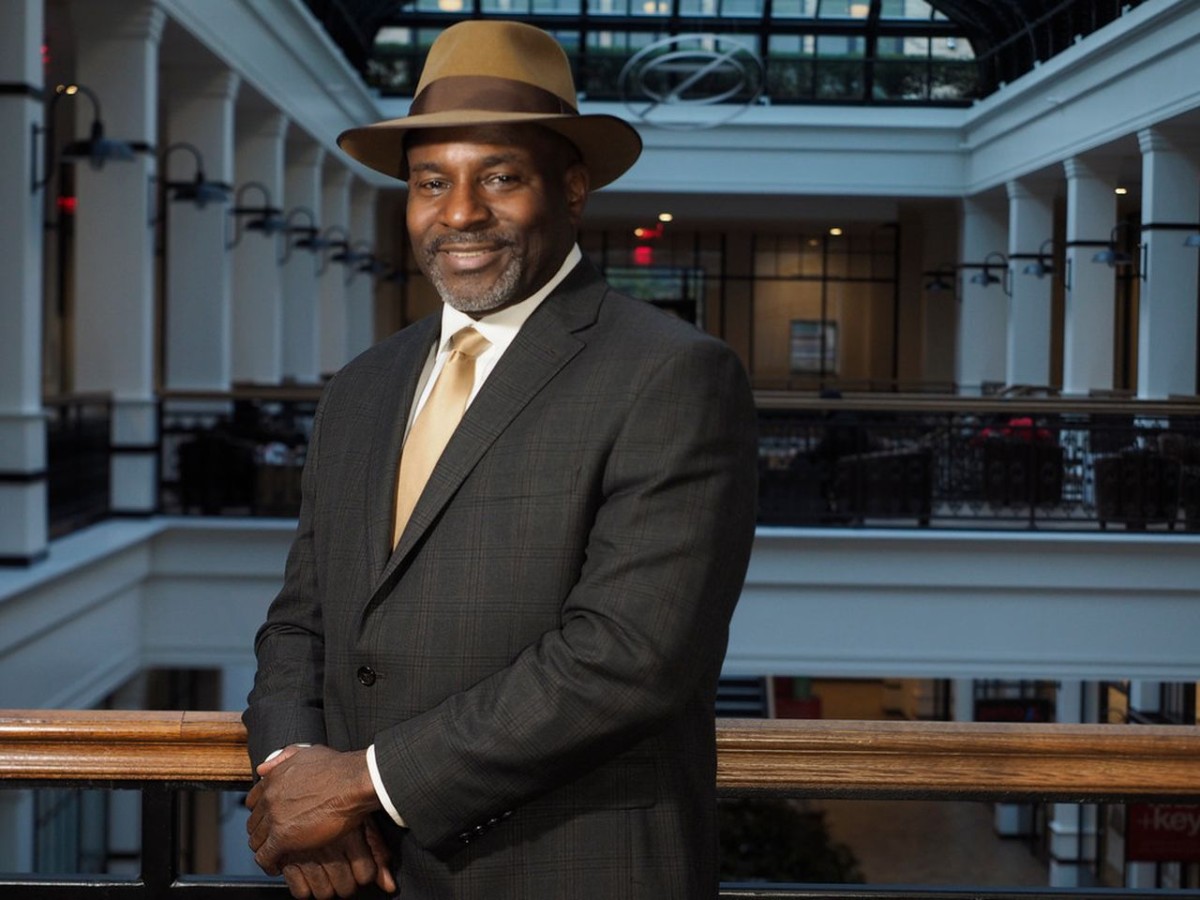 “I’m leaving for another challenge that will keep me in the neighborhood, but how do I say goodbye after news ink has been pumping through my veins for 35 years?” Barry Carter (pictured) wrote readers of the Star-Ledger in Newark, N.J., and NJ Advance Media, on Friday. “I began writing this column in 2004. It first appeared in Newark This Week, a section of the paper that ran every Thursday . . . The focus was my choice, so I picked you: real people with real stories. When that section folded, the column didn’t. It went statewide, introducing this village storyteller who flashed his human-interest spotlight on folks we all know. . . .”
“I’m leaving for another challenge that will keep me in the neighborhood, but how do I say goodbye after news ink has been pumping through my veins for 35 years?” Barry Carter (pictured) wrote readers of the Star-Ledger in Newark, N.J., and NJ Advance Media, on Friday. “I began writing this column in 2004. It first appeared in Newark This Week, a section of the paper that ran every Thursday . . . The focus was my choice, so I picked you: real people with real stories. When that section folded, the column didn’t. It went statewide, introducing this village storyteller who flashed his human-interest spotlight on folks we all know. . . .”
- “In April, FTVLive was the FIRST to tell you that BNC’s CEO Bob Brillante was gone from the company,” Scott Jones wrote Thursday for FTVLive about Black News Channel. “Now, BNC General Manager Frank Watson is headed to the exit. . . .” Jones posted a letter from Chairman J.C. Watts: “Frank’s journey with this project began back in 2004 when we filed for the Florida Limited Liability Corporation named Black Television News Channel LLC and he took on the title of General Manager, which he has held since. . . .”
- “ ‘High Noon’ may be over, but the ESPN careers of Bomani Jones and Pablo Torre are not, The Post has learned,” Andrew Marchand reported Tuesday for the New York Post. “Sources say both Jones and Torre have new contracts to stay with ESPN after the network pulled the plug on the duo’s debate program, ‘High Noon.’ . . .”
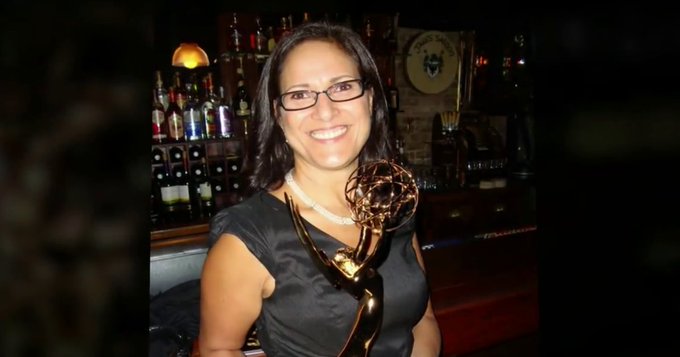 “The National Association of Hispanic Journalists on Wednesday announced the winners of its inaugural Ana Real Scholarship,” CBS News reported. “CBS News and NAHJ partnered to create the scholarship in honor of Real, an award-winning journalist who died at age 60 of leukemia in March 2019.” The $10,000 scholarship was awarded to Alanis Quiñones-Colón of the Universidad del Sagrado Corazón in Puerto Rico, and to Nathalie Nieves (pictured) of CUNY Queens College in New York. . . .”
“The National Association of Hispanic Journalists on Wednesday announced the winners of its inaugural Ana Real Scholarship,” CBS News reported. “CBS News and NAHJ partnered to create the scholarship in honor of Real, an award-winning journalist who died at age 60 of leukemia in March 2019.” The $10,000 scholarship was awarded to Alanis Quiñones-Colón of the Universidad del Sagrado Corazón in Puerto Rico, and to Nathalie Nieves (pictured) of CUNY Queens College in New York. . . .”
 Quiana Burns (pictured) will join “Weekend Good Morning America” as executive broadcast producer,” (scroll down) Ellise Shafer reported May 1 for Variety. “Burns will return to ‘GMA’ after working at MSNBC as executive producer of ‘MSNBC Live with Ali Velshi‘ and co-lead of the Black Employee Network for the news divisions of both MSNBC and NBC News. Before joining MSNBC, Burns was Robin Roberts’ anchor producer at ‘GMA.’ . . .”
Quiana Burns (pictured) will join “Weekend Good Morning America” as executive broadcast producer,” (scroll down) Ellise Shafer reported May 1 for Variety. “Burns will return to ‘GMA’ after working at MSNBC as executive producer of ‘MSNBC Live with Ali Velshi‘ and co-lead of the Black Employee Network for the news divisions of both MSNBC and NBC News. Before joining MSNBC, Burns was Robin Roberts’ anchor producer at ‘GMA.’ . . .”
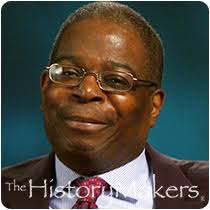 Jim DeRogatis who spent 15 years as the pop music critic at the Chicago Sun-Times, and Clarence Waldron (pictured), who had a 29-year tenure as senior writer and senior editor of Jet magazine, are to receive Lifetime Achievement Awards from the Chicago Headline Club’s 2020 Peter Lisagor Awards. DeRogatis has been investigating and writing about R. Kelly, accused of sex crimes, for almost 20 years. Waldron, sometimes called “the dean of entertainment journalists,” has been an adjunct professor at Northwestern University Medill School of Journalism since 1998.
Jim DeRogatis who spent 15 years as the pop music critic at the Chicago Sun-Times, and Clarence Waldron (pictured), who had a 29-year tenure as senior writer and senior editor of Jet magazine, are to receive Lifetime Achievement Awards from the Chicago Headline Club’s 2020 Peter Lisagor Awards. DeRogatis has been investigating and writing about R. Kelly, accused of sex crimes, for almost 20 years. Waldron, sometimes called “the dean of entertainment journalists,” has been an adjunct professor at Northwestern University Medill School of Journalism since 1998.
- “An AccuWeather broadcaster who was laid off because of the COVID-19 pandemic filed a lawsuit Monday arguing that decision was a violation of her contract with the media company,” Bret Pallotto reported April 24 for the Centre Daily Times in State College, Pa. “The two-count, 33-page lawsuit filed by senior television broadcaster Laura Velasquez is seeking to recoup unpaid salary and several lost benefits. . . .”
- “Station group Howard Stirk Holdings is settling for a Hundred Grand bar minus the chocolate and adding a whole lot of dough,” the subscription-only NewsBlues reported Tuesday. “HSH and owner Armstrong Williams have agreed to pay $100,000 and adopt a compliance regime [PDF].”
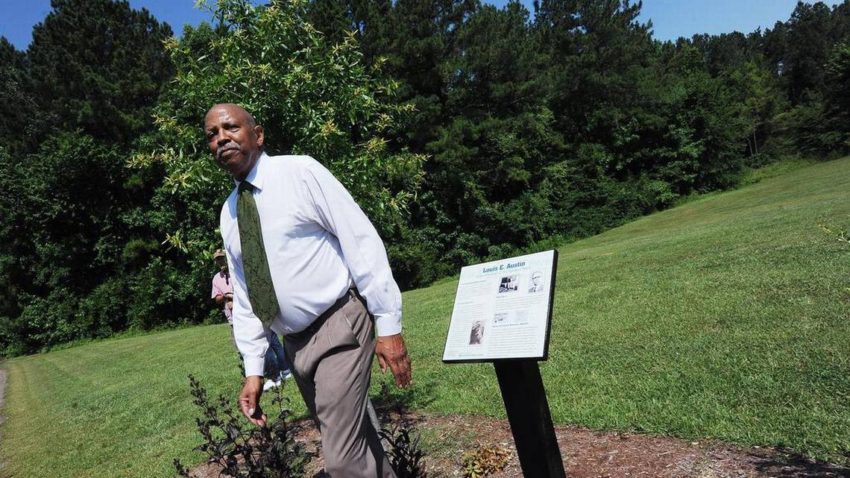
- “In honor of ESSENCE’s milestone year, iconic supermodel Naomi Campbell partnered with ESSENCE to grace the magazine’s first self-shot and styled cover,” Essence magazine announced Tuesday for its 50th anniversary. “In Campbell’s cover story, At Home With: Naomi Campbell, the supermodel prepares to celebrate her own milestone 50th birthday later this month and takes readers inside her life with an intimate self-portrait during COVID-19 social isolation. Using an iPhone, Campbell shot and styled all the photos herself — marking the first time she has ever photographed herself for a cover. . . . “
- “Seventy-nine undergraduate and graduate students have been selected to be trained and work this summer as data and digital journalists, business reporters and multiplatform editors in internships at media organizations through the Dow Jones News Fund,” the fund announced May 1. Internships will be offered remotely.

- “A former Chinese state media journalist turned anti-corruption blogger has been sentenced to 15 years in prison,” James Griffiths reported May 1 for CNN. “Chen Jieren was detained in mid-2018 after he published two articles on his personal blog claiming corruption by Hunan party officials. On Thursday, a court in the southern province jailed him for ‘picking quarrels and provoking trouble,’ extortion, blackmail and bribery, in what one human rights group said was an attempt to ‘punish him for his political speech on WeChat and other social media platforms.’. . .”
- A Philippine government agency on Tuesday ordered the country’s leading broadcast network, which the president has targeted for its critical news coverage, to halt operations,” Jim Gomez reported Tuesday for the Associated Press. “The National Telecommunications Commission ordered ABS-CBN Corp. to stop operations after its 25-year congressional franchise ended Monday. . . .”
- “Journalism in Egypt has effectively become a crime over the past four years, as authorities clamp down on media outlets and muzzle dissent, Amnesty International said in a report released Sunday,” the Associated Press reported. “As the number of coronavirus infections in Egypt continues to rise, the government is strengthening its control over information, the London-based rights group said, instead of upholding transparency during the public health crisis. . . .”
[btnsx id=”5768″]
Facebook users: “Like” “Richard Prince’s Journal-isms” on Facebook.
Follow Richard Prince on Twitter @princeeditor
Richard Prince’s Journal-isms originates from Washington. It began in print before most of us knew what the internet was, and it would like to be referred to as a “column.” Any views expressed in the column are those of the person or organization quoted and not those of any other entity. Send tips, comments and concerns to Richard Prince at journal-isms-owner@yahoogroups.com
View previous columns (after Feb. 13, 2016).
- Diversity’s Greatest Hits, 2018 (Jan. 4, 2019)
- Book Notes: Is Taking a Knee Really All That? (Dec. 20, 2018)
- Book Notes: Challenging ’45’ and Proudly Telling the Story (Dec. 18, 2018)
- Book Notes: Get Down With the Legends! (Dec. 11, 2018)
- Journalist Richard Prince w/Joe Madison (Sirius XM, April 18, 2018) (podcast)
- Richard Prince (journalist) (Wikipedia entry)
- February 2018 Podcast: Richard “Dick” Prince on the need for newsroom diversity (Gabriel Greschler, Student Press Law Center, Feb. 26, 2018)
- Diversity’s Greatest Hits, 2017 — Where Will They Take Us in the Year Ahead?
- Book Notes: Best Sellers, Uncovered Treasures, Overlooked History (Dec. 19, 2017)
- An advocate for diversity in the media is still pressing for representation, (Courtland Milloy, Washington Post, Nov. 28, 2017)
- Morgan Global Journalism Review: Journal-isms Journeys On (Aug. 31, 2017)
- Diversity’s Greatest Hits, 2016
- Book Notes: 16 Writers Dish About ‘Chelle,’ the First Lady
- Book Notes: From Coretta to Barack, and in Search of the Godfather
- Journal-isms’ Richard Prince Wants Your Ideas (FishbowlDC, Feb. 26, 2016)
- “JOURNAL-ISMS” IS LATEST TO BEAR BRUNT OF INDUSTRY’S ECONOMIC WOES (Feb. 19, 2016)
- Richard Prince with Charlayne Hunter-Gault,“PBS NewsHour,” “What stagnant diversity means for America’s newsrooms” (Dec. 15, 2015)
- Book Notes: Journalists Follow Their Passions
- Book Notes: Journalists Who Rocked Their World
- Book Notes: Hands Up! Read This!
- Book Notes: New Cosby Bio Looks Like a Best-Seller
- Journo-diversity advocate turns attention to Ezra Klein project (Erik Wemple, Washington Post, March 5, 2014)
![]()

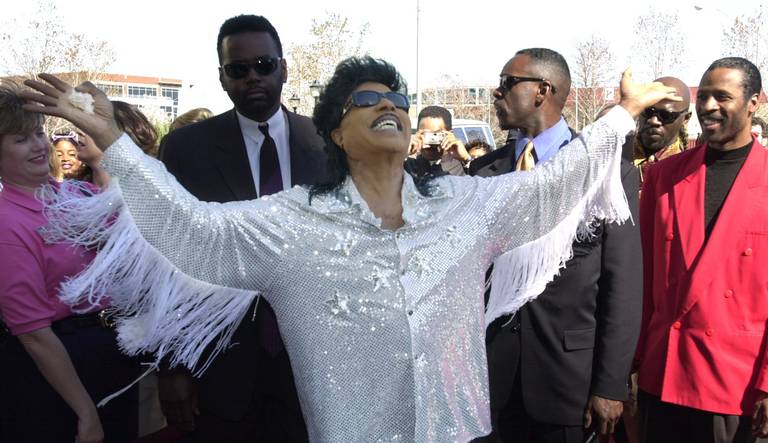
23 comments